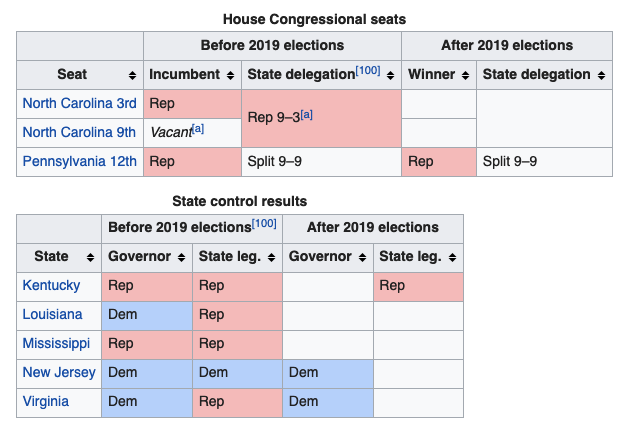Federal special elections
The following special elections will be held to replace members who resigned or died in the 116th U.S. Congress:
- Pennsylvania’s 12th congressional district: Republican Tom Marino resigned on January 23, 2019, to take a private sector job.[1] The district has a partisan index of R+17.[2] Republican state Rep. Fred Keller defeated Democrat Marc Friedenberg in the May 21 election, keeping the seat in Republican hands.[3][4]
- North Carolina’s 3rd congressional district: Republican Walter B. Jones Jr. died on February 10, 2019.[5] The district has a partisan index of R+12.[6] On April 30, primary elections were held and Democrat Allen M. Thomas and Libertarian Tim Harris advanced to the general election on September 10. In the July 9 Republican runoff, state Rep. Greg Murphy defeated Dr. Joan Perry.[7]
- North Carolina’s 9th congressional district: Due to allegations of election fraud, the results for the 9th congressional district were not certified for the 2018 election, leaving the seat vacant once the 116th Congress began (the seat was previously held by Republican Robert Pittenger, who lost his party’s nomination in 2018). On February 21, 2019, the North Carolina State Board of Elections voted unanimously to hold a new election.[8] The district has a partisan index of R+8.[9] Republican state Rep. Dan Bishop won the Republican primary to face Democrat Dan McCready, Libertarian Jeff Scott, and Green Loran Allen Smith in the September 10 general election.[10]
State elections
Partisan control of states prior to the 2019 elections.
Democratic trifecta
Republican trifecta
Divided government
Officially non-partisan legislature
The 2019 state elections will impact the redistricting that will follow the 2020 United States Census, as many states task governors and state legislators with drawing new boundaries for state legislative and Congressional districts. Republicans will defend their “trifecta” (unified control of the governorship and the state legislature) in Kentucky and Mississippi, while Democrats will defend their trifecta in New Jersey. The other two states holding elections, Louisiana and Virginia, both have a divided government, meaning that each major party controls the governorship or at least one legislative chamber.
Gubernatorial
Main article: 2019 United States gubernatorial elections
Three states will hold gubernatorial elections in 2019:
- Kentucky: One-term Republican Matt Bevin is seeking re-election. In the May 21 primaries, Bevin held off three opponents to win the Republican primary. He will face Attorney General Andy Beshear, who defeated two challengers in the Democratic primary.[11]
- Louisiana: One-term Democrat John Bel Edwards is seeking re-election. On the Republican side, U.S. Rep. Ralph Abraham and businessman Eddie Rispone have declared candidacy,[12] while U.S. Sen. John Neely Kennedy and U.S. Rep. Steve Scalise, widely expected to challenge Edwards, have declined to run.[13]
- Mississippi: Two-term Republican Phil Bryant is term-limited in 2019 and therefore ineligible to seek re-election. Potential Republican candidates include Mississippi House of Representatives Speaker Philip Gunn, former U.S. Senator Trent Lott, State Senator Chris McDaniel, Lieutenant Governor Tate Reeves, and Mississippi Supreme Court Chief Justice Bill Waller. Democratic candidates include Attorney General Jim Hood.[14]




